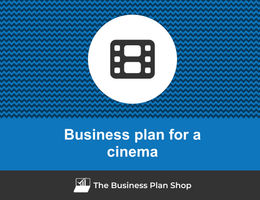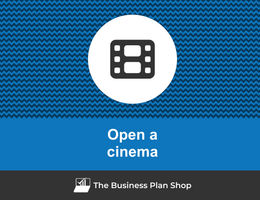How to create a financial forecast for a cinema?
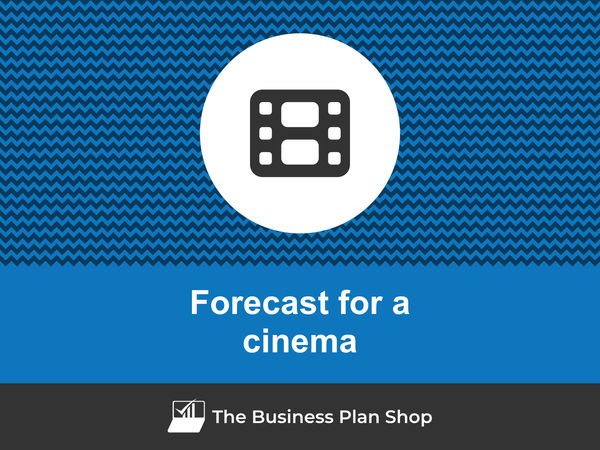
If you are serious about keeping visibility on your future cash flows, then you need to build and maintain a financial forecast for your cinema.
Putting together a cinema financial forecast may sound complex, but don’t worry, with the right tool, it’s easier than it looks, and The Business Plan Shop is here to guide you.
In this practical guide, we'll cover everything you need to know about building financial projections for your cinema.
We will start by looking at why they are key, what information is needed, what a forecast looks like once completed, and what solutions you can use to create yours.
Let's dive in!
Why create and maintain a financial forecast for a cinema?
Creating and maintaining an up-to-date financial forecast is the only way to steer the development of your cinema and ensure that it can be financially viable in the years to come.
A financial plan for a cinema enables you to look at your business in detail - from income to operating costs and investments - to evaluate its expected profitability and future cash flows.
This gives you the visibility needed to plan future investments and expansion with confidence.
And, when your trading environment gets tougher, having an up to date cinema forecast enables you to detect potential upcoming financing shortfalls in advance, enabling you to make adjustments or secure financing before you run out of cash.
It’s also important to remember that your cinema's financial forecast will be essential when looking for financing. You can be 100% certain that banks and investors will ask to see your numbers, so make sure they’re set out accurately and attractively.
Need a convincing business plan?
The Business Plan Shop makes it easy to create a financial forecast to assess the potential profitability of your projects, and write a business plan that’ll wow investors.

What information is needed to build a cinema financial forecast?
The quality of your inputs is key when it comes to financial modelling: no matter how good the model is, if your inputs are off, so will the forecast.
If you are building a financial plan to start a cinema, you will need to have done your market research and have a clear picture of your sales and marketing strategies so that you can project revenues with confidence.
You will also need to have a clear idea of what resources will be required to operate the cinema on a daily basis, and to have done your research with regard to the equipment needed to launch your venture (see further down this guide).
If you are creating a financial forecast of an existing cinema, things are usually simpler as you will be able to use your historical accounting data as a budgeting base, and complement that with your team’s view on what lies ahead for the years to come.
Let's now zoom in on what will go in your cinema's financial forecast.
The sales forecast for a cinema
The sales forecast, also called topline projection, is normally where you will start when building your cinema financial forecast.
Creating a coherent sales projection boils down to estimating two key drivers:
- The average price
- The number of monthly transactions
To do this, you will need to rely on historical data (for an existing business), market research data (for both new and existing cinemas), and consider the elements below:
- New Releases: The popularity and demand for new movies can greatly affect the average price and number of monthly transactions at your cinema. Highly anticipated films or blockbuster hits can drive up ticket prices and increase the number of movie-goers.
- Competition: The presence of other cinemas in the area can impact your average price and number of monthly transactions. If there are multiple cinemas offering similar movies and ticket prices, customers may choose to go to the one that offers the best deals or experience.
- Economic Conditions: Economic fluctuations can also affect your cinema's sales forecast. In times of economic downturn, people may be less willing to spend money on entertainment, resulting in a decrease in both average price and number of monthly transactions.
- Seasonal Demand: The time of year can also play a role in your sales forecast. During school holidays or summer breaks, families and students may have more free time to go to the movies, resulting in an increase in monthly transactions. On the other hand, colder months or holiday seasons may see a decrease in demand.
- Technology Advancements: With the rise of streaming services and online movie platforms, the way people consume movies is constantly changing. This can have an impact on your average price and number of monthly transactions, as customers may opt to stay at home and stream movies rather than going to the cinema.
After the sales forecast comes the operating expenses budget, which we will now look into in more detail.
Need a convincing business plan?
The Business Plan Shop makes it easy to create a financial forecast to assess the potential profitability of your projects, and write a business plan that’ll wow investors.

The operating expenses for a cinema
The next step is to estimate the expenses needed to run your cinema on a day-to-day basis.
These will vary based on the level of sales expected, and the location and size of your business.
But your cinema's operating expenses should include the following items at a minimum:
- Staff costs: This includes salaries, bonuses, benefits, and any other expenses related to your employees. As a cinema, you'll need to budget for ticket sellers, ushers, concession stand workers, projectionists, and other staff members to ensure smooth operation of your business.
- Accountancy fees: You'll need to hire an accountant to manage your financial records, taxes, and other financial matters. This expense may also include software or other tools to help with accounting tasks.
- Insurance costs: You'll need to have insurance to protect your business from potential risks and liabilities, such as property damage, employee injuries, or lawsuits. This expense may include general liability insurance, property insurance, and workers' compensation insurance.
- Software licenses: As a cinema, you'll likely need to use software for ticketing, concessions, scheduling, and other operations. This expense may include licenses for specific software programs or subscriptions for cloud-based services.
- Banking fees: You'll need to have a business bank account to manage your finances and make transactions. This expense may include fees for maintaining the account, processing payments, and other banking services.
- Rent: You'll need to pay rent for your cinema space, whether it's a standalone building or a space in a shopping center. This expense may also include utilities, such as electricity, water, and internet.
- Marketing and advertising: To attract customers and promote your cinema, you'll need to invest in marketing and advertising efforts. This expense may include social media ads, print ads, flyers, and other promotional materials.
- Maintenance and repairs: You'll need to regularly maintain and repair your cinema equipment, such as projectors, sound systems, and seats. This expense may also include janitorial services to keep your cinema clean and presentable.
- Concession supplies: As a cinema, you'll likely sell snacks and drinks at your concession stand. This expense includes purchasing supplies, such as popcorn, candy, and soda, to sell to customers.
- Film licensing fees: You'll need to pay fees to movie studios to screen their films in your cinema. This expense may vary depending on the popularity and newness of the films you choose to show.
- Security: To ensure the safety of your customers and employees, you may need to hire security guards or invest in security measures, such as cameras and alarm systems. This expense may also include background checks for your staff members.
- Training and development: To provide excellent customer service and improve your employees' skills, you may need to invest in training and development programs. This expense may include workshops, online courses, or hiring trainers.
- Professional fees: You may need to hire lawyers, consultants, or other professionals to help with legal, financial, or other matters related to your cinema. This expense may also include fees for permits and licenses.
- Office supplies: You'll need to purchase office supplies, such as paper, ink, and pens, to manage your administrative tasks. This expense may also include equipment, such as computers and printers.
- Miscellaneous expenses: Finally, you'll need to budget for unexpected expenses that may arise, such as equipment repairs, emergency repairs, or unexpected legal fees.
This list is, of course, not exhaustive, and you'll have to adapt it according to your precise business model and size. A small cinema might not have the same level of expenditure as a larger one, for example.
What investments are needed to start or grow a cinema?
Once you have an idea of how much sales you could achieve and what it will cost to run your cinema, it is time to look into the equipment required to launch or expand the activity.
For a cinema, capital expenditures and initial working capital items could include:
- Projector and Sound System: This is a crucial investment for any cinema as it is responsible for providing the ultimate movie-viewing experience for your customers. The quality of the projector and sound system can significantly impact the overall satisfaction of your audience.
- Seating and Furniture: Comfortable and well-maintained seating is essential for creating a pleasant and inviting atmosphere in your cinema. This includes chairs, couches, and other furniture such as tables and counters for concessions and ticket sales.
- Concession Equipment: Popcorn machines, soda fountains, and other concession equipment are necessary for providing refreshments to your customers. It is important to invest in high-quality, durable equipment to ensure efficient operations and customer satisfaction.
- Theater Construction and Renovations: If you are building a new cinema or expanding your current one, the cost of construction and renovations should be included in your expenditure forecast. This may include the cost of building materials, contractors, and permits.
- Technology Upgrades: In today's digital age, it is important to keep up with the latest technology in the cinema industry. This may include investments in 3D screens, virtual reality experiences, or other innovative technologies that can enhance the movie-going experience for your customers.
Again, this list will need to be adjusted according to the specificities of your cinema.
Need a convincing business plan?
The Business Plan Shop makes it easy to create a financial forecast to assess the potential profitability of your projects, and write a business plan that’ll wow investors.

The financing plan of your cinema
The next step in the creation of your financial forecast for your cinema is to think about how you might finance your business.
You will have to assess how much capital will come from shareholders (equity) and how much can be secured through banks.
Bank loans will have to be modelled so that you can separate the interest expenses from the repayments of principal, and include all this data in your forecast.
Issuing share capital and obtaining a bank loan are two of the most common ways that entrepreneurs finance their businesses.
What tables compose the financial plan for a cinema?
Now let's have a look at the main output tables of your cinema's financial forecast.
The projected profit & loss statement
The projected profit & loss shows how profitable your cinema is likely to be in the years to come.
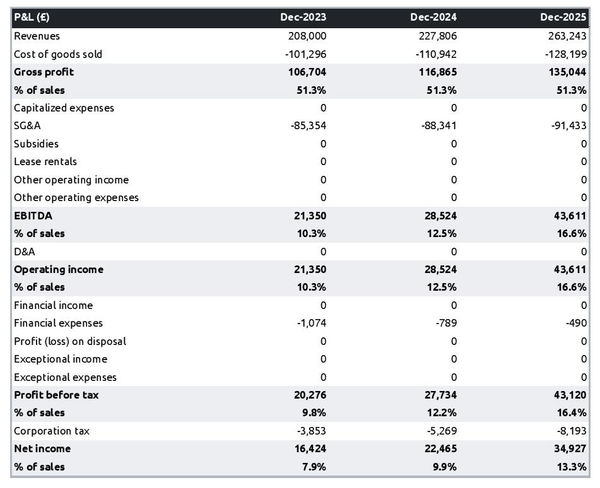
For your cinema to be financially viable, your projected P&L should ideally show:
- Sales growing above inflation (the higher the better)
- Profit margins which are stable or expanding (the higher the better)
- A net profit at the end of each financial year (the higher the better)
This is for established cinemas, there is some leniency for startups which will have numbers that will look a bit different than existing businesses.
The projected balance sheet
The projected balance sheet gives an overview of your cinema's financial structure at the end of the financial year.
It is composed of three categories of items: assets, liabilities and equity:
- Assets: are what the business possesses and uses to produce cash flows. It includes resources such as cash, buildings, equipment, and accounts receivable (money owed by clients).
- Liabilities: are the debts of your cinema. They include accounts payable (money owed to suppliers), taxes due and bank loans.
- Equity: is the combination of what has been invested by the business owners and the cumulative profits to date (which are called retained earnings). Equity is a proxy for the value of the owner's stake in the business.
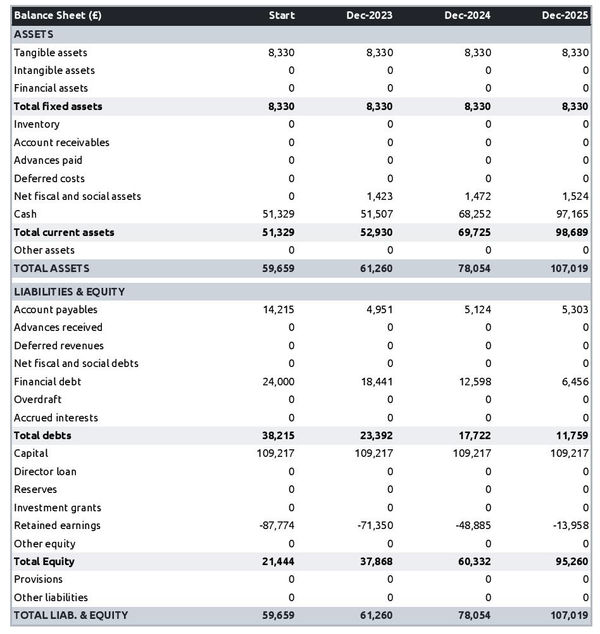
The projected cash flow statement
A projected cash flow statement for a cinema is used to show how much cash the business is generating or consuming.
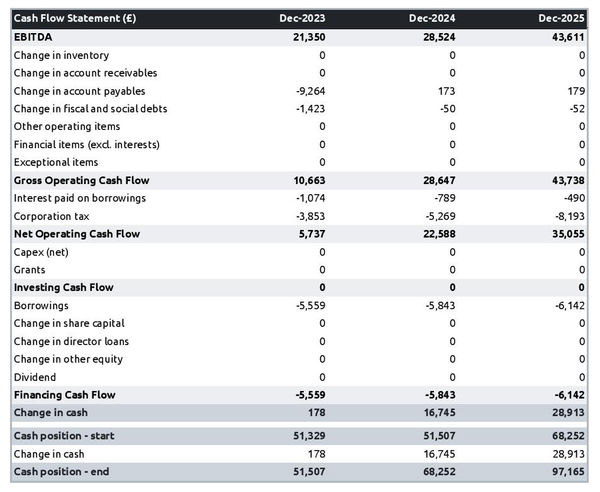
The cash flow forecast is usually organised by nature to show three key metrics:
- The operating cash flow: do the core business activities generate or consume cash?
- The investing cash flow: how much is the business investing in long-term assets (this is usually compared to the level of fixed assets on the balance sheet to assess whether the business is regularly maintaining and renewing its equipment)?
- The financing cash flow: is the business raising new financing or repaying financiers (debt repayment, dividends)?
Cash is king and keeping an eye on future cash flows is imperative for running a successful business. Therefore, you should pay close attention to your cinema's cash flow forecast.
If you are trying to secure financing, note that it is customary to provide both yearly and monthly cash flow forecasts in a financial plan - so that the reader can analyze seasonal variation and ensure the cinema is appropriately capitalised.
Need a convincing business plan?
The Business Plan Shop makes it easy to create a financial forecast to assess the potential profitability of your projects, and write a business plan that’ll wow investors.

Which tool should you use to create your cinema's financial forecast?
Using the right tool or solution will make the creation of your cinema's financial forecast much easier than it sounds. Let’s explore the main options.
Using online financial forecasting software to build your cinema's projections
The modern and easiest way is to use professional online financial forecasting software such as the one we offer at The Business Plan Shop.
There are several advantages to using specialised software:
- You can easily create your financial forecast by letting the software take care of the financial calculations for you without errors
- You have access to complete financial forecast templates
- You get a complete financial forecast ready to be sent to your bank or investors
- You can easily track your actual financial performance against your financial forecast, and recalibrate your forecast as the year goes by
- You can create scenarios to stress test your forecast's main assumptions
- You can easily update your forecast as time goes by to maintain visibility on future cash flows
- You have a friendly support team on standby to assist you when you are stuck
- It’s cost-efficient and much cheaper than using an accountant or consultant (see below)
If you are interested in this type of solution, you can try our forecasting software for free by signing up here.
Hiring a financial consultant or chartered accountant
Hiring a consultant or chartered accountant is also an efficient way to get a professional cinema financial projection.
As you can imagine, this solution is much more expensive than using software. From experience, the creation of a simple financial forecast over three years (including a balance sheet, income statement, and cash flow statement) is likely to start around £700 or $1,000 excluding taxes.
The indicative estimate above, is for a small business, and a forecast done as a one-off. Using a financial consultant or accountant to track your actuals vs. forecast and to keep your financial forecast up to date on a monthly or quarterly basis will naturally cost a lot more.
If you choose this solution, make sure your service provider has first-hand experience in your industry, so that they may challenge your assumptions and offer insights (as opposed to just taking your figures at face value to create the forecast’s financial statements).
Why not use a spreadsheet such as Excel or Google Sheets to build your cinema's financial forecast?
Creating an accurate and error-free cinema financial forecast with a spreadsheet is very technical and requires a deep knowledge of accounting and an understanding of financial modelling.
Very few business owners are financially savvy enough to be able to build a forecast themselves on Excel without making mistakes.
Lenders and investors know this, which is why forecasts created on Excel by the business owner are often frowned upon.
Having numbers one can trust is key when it comes to financial forecasting and to that end using software is much safer.
Using financial forecasting software is also faster than using a spreadsheet, and, with the rise of artificial intelligence, software is also becoming smarter at helping us analyse the numbers to make smarter decisions.
Finally, like everything with spreadsheets, tracking actuals vs. forecasts and keeping your projections up to date as the year progresses is manual, tedious, and error-prone. Whereas financial projection software like The Business Plan Shop is built for this.
Need a convincing business plan?
The Business Plan Shop makes it easy to create a financial forecast to assess the potential profitability of your projects, and write a business plan that’ll wow investors.

Use our financial forecast templates for inspiration
The Business Plan Shop has dozens of financial forecast examples available.
Our templates contain both a financial forecast and a written business plan which presents, in detail, the company, the team, the strategy, and the medium-term objectives.
Our templates are a great source of inspiration, whether you just want to see what a complete business plan looks like, or are looking for concrete examples of how you should model financial elements in your own forecast.
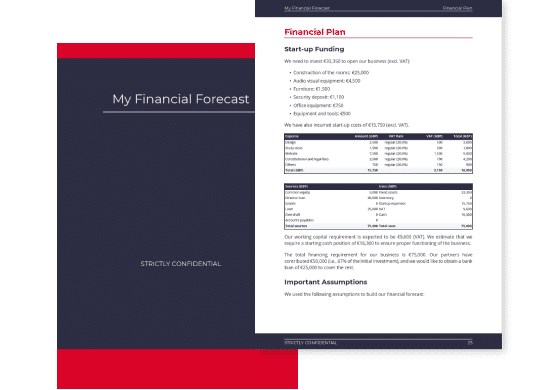
Takeaways
- Having a financial forecast enables you to visualise the expected growth, profitability, and cash generation for your business over the next three to five years.
- Tracking actuals vs. forecast and keeping your financial projections up-to-date is the only way to get a view on what your cinema future cash flows may look like.
- Using financial forecasting software is the mordern and easy way to create and maintain your forecasts.
This is the end of our guide on how to build the financial forecast for a cinema, we hope you found it useful. Don't hesitate to contact us if you want to share your feedback or have any questions.
Need a convincing business plan?
The Business Plan Shop makes it easy to create a financial forecast to assess the potential profitability of your projects, and write a business plan that’ll wow investors.

Also on The Business Plan Shop
- Example of financial forecast
- Financial forecast template for a business idea
- How to create a turnover forecast for a business?
Know someone who owns or is thinking of starting a cinema? Share our forecasting guide with them!


